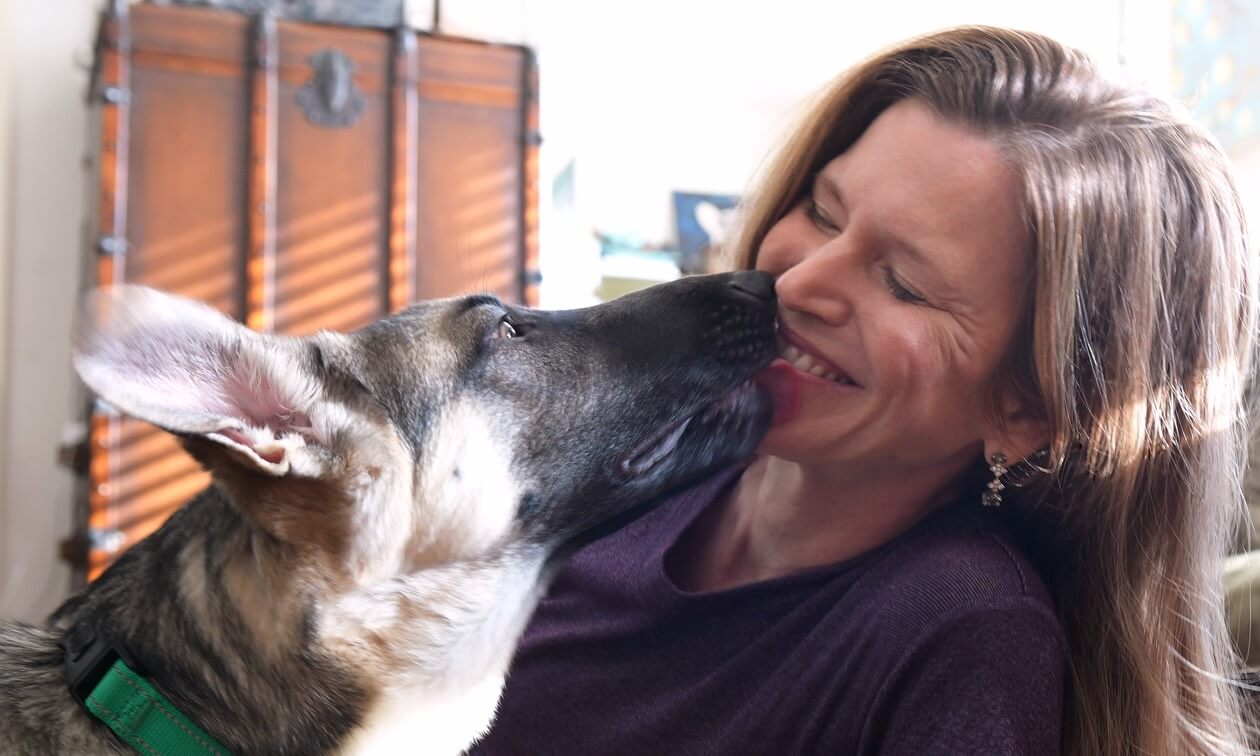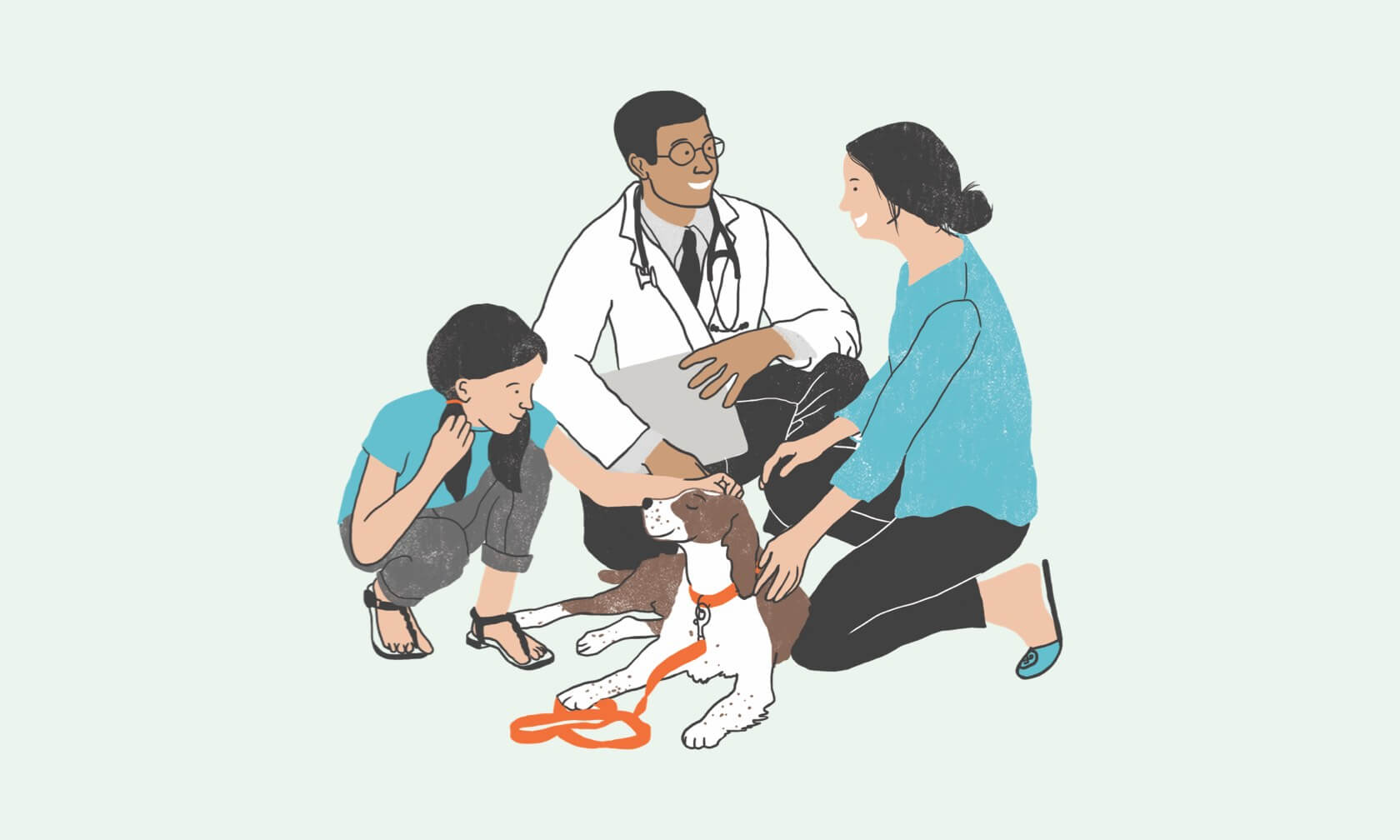Is your “good morning” kiss from your dog so stinky that their breath makes you want to cover your face with a pillow? Bad breath in dogs is not only undesirable — it's not normal.
While eating deer poop or getting into some old food in the trash bin might come with some gross smells, your dog’s bad breath — vets call it halitosis — is most likely the result of dental disease (or more accurately, periodontal disease). In some cases, it can even be due to an underlying health condition like kidney disease or diabetes[1].

Causes of Bad Breath in Dogs
Dental Disease
Periodontal disease in dogs is inflammation, and sometimes infection, of the tissues surrounding the teeth, including the gums, the structures that hold the teeth in place, and even the jawbone. Periodontal disease is very common in pets — as many as 80% of dogs have some form of periodontal disease by the time they’re just two years old[2]. This disease is caused by untreated plaque buildup leading to formation of tartar (also called calculus) on the teeth.
When a dog suffers from periodontal disease, even a mild form, they can and frequently do develop bad breath. The source of bad breath is bacteria that accumulate with tartar and become adhered to teeth in plaque, causing inflammation and tissue damage that worsen over time when not treated[3]. This is why it is very important to take care of your dog’s mouth with dedicated teeth brushing at home and regular professional dental cleanings for your dog.
Other Explanations
Foreign objects like pieces of sticks or toys can become lodged in your dog’s mouth and lead to damage or infection causing bad breath.
Some types of metabolic disease (like diabetes mellitus) or organ disease (like kidney or liver disease) can also result in bad breath[1]. In these diseases, bad breath results from a buildup of toxins in the bloodstream because organs are not doing their jobs properly or are overwhelmed by large amounts of certain body substances. For example, in uncontrolled diabetes there can be a buildup of ketones that cause a sweet smell to the breath (although only some people can smell this thanks to a genetic trait, while others cannot).
Cancer or tumors in the mouth can also cause bad breath because they cause tissues to lose their blood supply and die. Your veterinarian will often recommend a thorough examination of the entire mouth and full bloodwork (sometimes called blood tests) if the cause of your dog’s bad breath is not easily found.
Signs of Dental Disease as the Cause of Bad Breath
If your dog has bad breath from dental disease, you may notice issues with their teeth or mouth, their overall comfort, or even their behavior. Things to be on the watch for include, but are not limited to:
- Discoloration of your dog's teeth
- Visible tartar on the surface of the teeth (gray, brown, or yellow concrete-looking buildup)
- Inflamed/red gums (gingivitis)
- Excessive drooling
- Chewing only on one side of the mouth
- Blood on toys or chews
- Loss of appetite or avoiding food (especially dry food like kibble)
- Teeth grinding
What to Do If Your Dog Has Bad Breath
So how can you get rid of your dog’s bad breath? First, it's time to check in with your veterinarian — and don’t wait. Even if your dog seems fine to you, bad breath is not normal and requires investigation. Your veterinarian will perform a thorough physical exam of your dog’s whole body, then take a good look inside their mouth. Your vet will look for inflammation of the gums (gingivitis), tartar buildup on the teeth, and any objects stuck in the mouth (like a piece of stick). Your vet will also feel your dog’s lymph nodes under the chin for enlargement that might hint to something wrong in the mouth.
Be prepared to answer your veterinarian’s questions about what you feed your dog — canned or dry food, brand names, and any snacks or treats — as well as your dog’s eating and drinking habits, and any changes you have noticed in their behavior or energy level. Providing your vet with accurate answers to these questions can help them put together the pieces of the puzzle and find answers for you and your pup.
There are some situations in which your veterinarian needs to look more thoroughly at your dog’s mouth and throat. Unlike humans, most dogs do not cooperate with instructions to “open up wide” so sedation or anesthesia might be required and recommended by your vet.
If the cause of your dog’s breath remains a mystery after a physical and oral examination, your veterinarian will likely recommend some bloodwork to look for issues with internal organs, such as kidney or liver disease. Blood tests can also detect elevated levels of blood sugar, which could indicate diabetes.
Treatment for Common Dental Problems Causing a Dog's Bad Breath
Treatment options for your dog’s bad breath depend on the cause and severity of the issue. Your veterinarian will work with you to determine the ideal course of action. Sometimes a routine professional dental cleaning to scale and polish the teeth to remove excess plaque and tartar is all that may be required. Other times, your dog may require the removal of a diseased tooth to help resolve their discomfort. Or perhaps your veterinarian will dispense a medication such as antibiotics or anti-inflammatories if needed for their condition.
Specialty veterinary dentists do exist and can help with more challenging, complex, or unusual dental cases; your veterinarian will recommend or refer you to one if needed for your dog.
How to Prevent Bad Breath in Your Dog
If you start to notice bad breath in your dog (or if they've always had bad breath that hasn't been addressed), it is important to make a trip to your veterinarian, and sooner rather than later. But there are things you can do to help prevent bad breath before it starts and keep your dog healthy.
Daily Brushing
Daily brushing of your dog's teeth will help reduce plaque buildup and prevent tartar from becoming plaque, which is adhered to your teeth and much harder to remove. It's important to use a toothbrush and toothpaste specifically designed for dogs — human toothbrushes are often too abrasive and human toothpaste can be toxic to pets.
Dental Treats
Dental treats, and specific dental diets that help prevent tartar buildup on the teeth, can be used in conjunction with — but never in place of — daily brushing and regular veterinary check-ups.
Check for Chewing
Keep a watchful eye on your dog's chewing habits. Chewing on the wrong things can break teeth, irritate or damage the gums, or even result in objects getting lodged in your dog’s mouth or throat.
Talk to your veterinarian about which products make sense for your dog's individual needs and look for the Veterinary Oral Health Council (VOHC) seal of approval on products to ensure they are considered safe and effective.
Even with dedication to brushing and following the tips above, dogs still need regular professional dental exams and cleanings. Think about us humans. Even though we brush and floss regularly (okay, maybe not as often as we are supposed to), we still need to visit the dentist for a thorough dental examination and teeth cleaning. Regular dental cleanings are considered part of your dog's routine preventive care. They’re essential to allow your veterinarian to remove tartar and plaque not only on the teeth but beneath the gum-line — where a typical toothbrush can't reach — before they can cause damage, discomfort, and the need for expensive treatment.
If your dog has bad breath, it's important to check in with your veterinarian. You can identify problems before they become painful and costly, ensure there are no other health conditions causing smelly breath, and resolve the issue so you can get back to enjoying morning kisses from your dog.
ZPC-01019R2
- Barko P. Halitosis. BSAVA Manual of Canine and Feline Gastroenterology. 2019. British Small Animal Veterinary Association.
- Wiggs RB, Lobprise HB. Periodontology. In: Veterinary Dentistry: Principals and Practice. Philadelphia: Lippencott-Raven; 1997:186-231.
- Niemiec BA. Periodontal Disease. Top Companion Anim Med. 2008; 23: 72–80.



